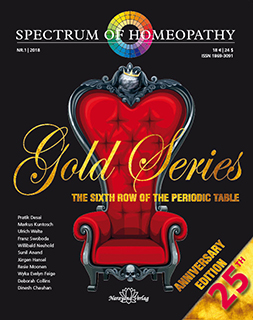

Blog archive
Follow us
Homeopathy and the world
This blog talks about interrelations of homeopathy and holistic ways of healing with the world beyond medicine, with spirituality, science and politics. The homeopathic way of thinking and questioning about problems, crises and solutions is extended to encompass more than issues of individual health. During two hundred years of work with crises and suffering we have developed a holistic way of looking at contexts and a specific way of listening, which may prove to be very helpful in collective contexts as well. In a loose series of articles I wish to show this by different current issues. This work is licensed under a Creative Commons License (Attribution-NonCommercial-NoDerivatives 4.0 International (CC BY-NC-ND 4.0)). You may distribute and reproduce it in accordance with the license terms.
(Not being a native speaker I apologize for any mistakes and appreciate any kind of amendment.) .
Jörg Wichmann, November 2017
BLOG
Understandable Reflexes or: There is no Believing a Liar, even when he Speaks the Truth
(This article has been published in its German original version by the online magazine Rubikon on Oct 9th 2019.)
How can we preserve strength, courage and clarity in a situation in which we are not only constantly lied to and misinformed by the political elites and their beneficiaries, but in which everything can be called into doubt because no truth seems to prevail any longer?
Doubt, discord and quarrels are an unbearable burden for a movement. We already have a hard enough time maintaining our critical and committed attitude. Internal destabilization is exactly what we do not need and what plays into the hands of those in power, which is why they are trying to provoke just that.
This article is a contribution to an ongoing argument about the climate and environmental crises that is taking place within the alternative movement.
It is indeed difficult to understand how people can write that climate change is an invention. If you leave your computer screen from time to time and take a look outside, you will hardly be able to overlook the dramatic decline in insects and birds and the dying trees. And those who are old enough to remember the last century will also be able to confirm that the last few years are the hottest we have known. And anyone who has ever set out on foot to the Alps knows the decline of glaciers from their own experience. If these aren't all holograms that the evil climate conspirators have superimposed over nature, which is still intact everywhere, to deceive me and recruit me for the CO2 sect, then I know from my own experience and completely free of possible "inventions" that something big is changing in my world in a threatening way.
Nevertheless, some of us more critical spirits seem to question this climate change or at least the obvious causation of it by humans. And this being said by people and colleagues whom I do not want to accuse of being paid by the oil industry – not everything can be explained by conspiracy theories.
The subject is too serious and too urgent for us to get caught up in a fruitless discussion here, because the arguments are all known and some of them quite obvious. But nevertheless I ask myself: What drives those who simply deny such clear and self-experienceable perceptions and facts and try to reinterpret them by means of peculiar mental constructions?
I believe that we are dealing here with a reflex to the fact that we are constantly being lied to by politicians and the mass media, that everywhere important information is being withheld from us and that dissenting opinions are being suppressed.
Obviously, some react to this with a generalized defensive reflex according to the motto: Whoever lies once, one does not believe, even if he speaks the truth, and fundamentally question everything that is claimed in the mainstream media. This is understandable, and a certain probability also suggests that in most cases the opposite of what is publicly pretended to be the case is the case. But how do we distinguish the wheat from the chaff? We can’t be everywhere and see and experience it ourselves. Because even if climate change is becoming abundantly apparent on my doorstep, I cannot know whether the reports from the Arctic, Siberia and the Maldives are true or not. How can we still know today what we can believe and what not and which messages require our action and our opinion?
In order to find orientation for myself, I always ask the good old Roman question: Cui bono? - Who benefits from that? Who gets what out of it? Where does that lead to? Sometimes this question also borders on the journalistic motto: Follow the money, but not always.
The simple truth needs no lobby and no media effort, because it reflects the world as it is. But a distortion, concealment or even invention of facts always requires an interest group that seizes the simple truth and spreads it to the public in the falsified version it wants. This requires a lot of money and also the power to suppress voices that say otherwise. Because the simple truth always carries in itself the power that it is true and does not need disguises. Such a high expenditure as the falsification of the truth is only pursued if the interests behind it are important and the profit is higher than the expenditure pursued. Or, however, the motive is an ideological delusion of enormous extent, as we know it from ideological fanatics. – These considerations result from the short question Cui bono?, and they are logical and not to be dismissed and need no complicated theory. That is why I prefer to lean on them.
If we ask ourselves this with regard to the allegations about climate change, we can easily say that at the latest since the first report of the Club of Rome in 1972 (and no, it was not invented retrospectively; I can remember it myself...) the problem of the growth ideology has been pointed out. Concern about the threat of climate change has been depressing well-informed and socially or environmentally-minded people all over the world for decades. Not only the well-founded predictions but also the worst fears that we have voiced for decades have all arrived and, in some cases, been far outbid. None of the warners, the "doomsayers" and the "pessimists" of these decades had anything to gain from it, because these warnings went head-on against the interests of the ruling corporations and investors, who were and still are interested in further growth and unrestrained exploitation of natural resources.
What good would it do the big oil companies, the coal, nuclear and agricultural industries to spread myths about alleged climate change through the mass media, which is corrupting their business model and making masses of people openly advocate system change? Which more powerful conspirators than the interest groups mentioned are supposed to be pulling the strings in the background? The meteorologists' association, which perhaps dedusts a few million research funds with it (yes, this is claimed, no joke)? Or the few dozen producers of wind turbines whose annual turnover would fit comfortably into the petty cash of any oil company?
Who benefits from it? is the decisive question here that can quickly bring the discussion to an end. Who is acting in whose interest? If someone tells me that my house is on fire and that my children are still in there, then I will not first go into the details of whether this person is properly dressed, whether he or she speaks too loudly or perhaps enjoys the attention that such a message evokes. Nor will I require her to provide me with evidence that the smoke rising above my house was really caused by a fire.
What is important about Greta is not her possible personal background or who might be trying to take advantage of her current prominence. The only important thing is that she is right, that she speaks the simple truth clearly and that we have less and less time to react.
What she says we have known for decades, or at least all those who have been interested and informed and have not allowed themselves to be lulled by the ideology of constant growth. It was not in the interests of the elites or large corporations that this knowledge came to the attention of the general public, but against them.
If the ruling elites and governments were behind it, then it would be to be expected that they would immediately use the opportunity of a mass movement in the direction they wanted to implement their programs. But we are seeing the exact opposite. We observe that all politicians agree with the demands of the FfF in a public way (We have heard the call....), but in fact boycott the necessary measures everywhere.
At this point, I would also like to raise the question of where the criticism that calls climate change into question or the human causes of it should go. What do those who publicly represent such denial want to achieve? Should we continue as before? Business as usual? Should we trust that the oil and coal companies will continue to supply us with “clean” energy? Even if it turns out that there are factors other than human damage to the environment – which may be the case – to the climate disaster, it is still right and urgent to take all the proposed measures. The environmental movement has been pressing for these measures for decades and they are vital to us for many reasons, not just because of the climate disaster.
Time is too short for me to want to argue with those who say that a fire might do my house some good now and then and that I might be able to bring new children into the world afterwards. And insulting the person who brings me the threatening news does not help either. The arguments against the persons of the messengers expose those who want to prevent necessary changes.
As well as I can understand the reflexes and also know from myself how to first question and reject everything that comes "from above", because a burnt child avoids fire and you don't like to believe the liars again, it can be so important not only to behave reflexively but rather to think about things in peace. Fear is not a good advisor to try another proverb. If you notice a tendency towards such understandable reflexes, the first thing you can do is ask yourself the simple question: Who benefits from that? Who benefits from my doubts and who benefits from my commitment?
It is important that we do not allow ourselves to be divided in the critical movement. Let us not allow the few of us who have awakened and become involved to sow discord and doubt between ourselves. In the tense situation and in the face of global threats from different directions, it gives us the most strength and clarity to trust in our own perceptions and in our common sense.
Back again to my question: What drives those who deny the obvious? The described and understandable reflex to accuse the authorities and their henchmen of lying, certainly explains some reactions. But climate change and the extinction of species do not take place on the screen and in the press, but in real life, outside my door. I see the change with my own eyes, I don't hear the voices of the birds I know from before, I feel the dryness of the earth. I cannot say that I miss the mosquitoes in my bedroom, but I experience their absence. I don't need statistics to be able to judge the death of insects, I just need a look at my car window. Not too long ago, we used to have to interrupt holiday trips every few hours because we couldn't see through the windshield anymore.
Nobody has to persuade me of these changes because I have been observing, describing and incriminating them since my childhood. The resulting desperation because of our powerlessness to change anything about it against the powerful, I experience not since Greta appeared on the scene, but since I am old enough to inform myself. And I also know the resignation in the face of this powerlessness, which tells me: You can't do anything anyway and you've already tried so much, go on holiday first.
But those who permanently deny even their own perceptions and the obvious have deeper reasons than an anti-authoritarian reflex. I believe that the threat to our way of life and all that is dear and comfortable to us, that this threat becomes so overwhelmingly great that it often first produces a denial.
We know this from shock conditions in people who have suffered a great loss. The first reaction is denial: “No, he is not dead. They only say that, they misidentified him. He will wake up immediately. This is all just a mistake.” or: “The smoke certainly doesn't come from my house. That is certainly another one.” - The denial of reality can help us to remain conscious and functional in the first moments of situations threatening our existence and to bring us or others to safety. The collapse comes later.
In acute situations, such as accidents, this natural reflex of denial can be helpful, but it is not in ongoing collective developments. However, we must understand that many people, by denying the obvious, even denying their own perception and experience, temporarily want to keep despair and overwhelming fear at bay. They can then continue to live their daily lives and write a few astonished or angry articles about why others react so hysterically and run around so hectically just because their house is on fire and their children are dying.
We only become capable of action when we have the breakdown and despair behind us and live with the knowledge that they can catch up with us at any time.
Greta is absolutely right that those who believe to have done enough with a few adjustments and taxes and electric cars to avert the catastrophe have not yet understood what it is about. They persist in denial and avoid the fear and despair that follows the acceptance of the message.
The experienced US-American activist Joanna Macy, now ninety years old, created a group work for political and ecological activists a good thirty years ago, which she called "despair and empowerment work". She knew and had experienced that the awakening of strength and the ability to act can only come about when we have faced despair and learned to deal with it. Only denial protects us from despair, but denial also prevents us from meaningful, purposeful action. As soon as we realize what is coming up to us and the next generation, despair and panic seize us first. We cannot defeat them because the catastrophe is real and can be experienced directly. But we can learn to deal with it. This ability is called courage. Courage only arises after denial and after despair. Those who have not yet understood the situation cannot be courageous.
Facing reality, letting the extent of the catastrophe we have caused get to us, requires courage. The temptation to deny the threatening reality, to resist it and to take an open look at the destruction that has already begun requires strength. But if we muster that courage and strength, and if we help each other to endure fear and despair – and only together can that be endured – it will eventually bring new strength (therefore: despair and empowerment) and new courage to act. Then we don't get involved because we naively believe that with a little effort everything will be fine again, but because we have survived looking into the abyss and know that there is no alternative to going on, to getting involved together and to seeking our chance where there doesn't seem to be one anymore.
It is David's fight against the overpowering Goliath, seemingly without any chance of success. Let us be David and win.
You can share this article with:
more than thousand
homoeopathic
books by Narayana
________________
more than thousand
homoeopathic
books by Narayana
________________
more than thousand
homoeopathic
books by Narayana
________________





